Samaaro + Your CRM: Zero Integration Fee for Annual Sign-Ups Until 30 June, 2025
- 00Days
- 00Hrs
- 00Min
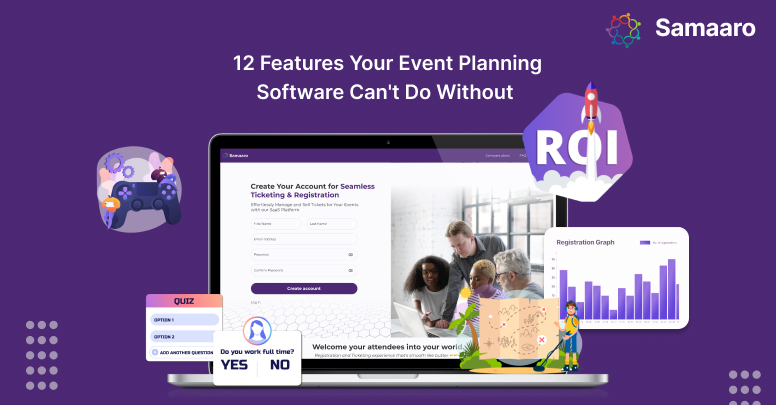
Ever pondered the secret to flawlessly executed events that leave attendees in awe? It’s not just impeccable planning. Here’s a stat that’ll leave you intrigued: 90% of event coordinators have harnessed the power of event management software to create and execute their spectacular events as found in Capterra’s study. Having the proper software can transform your events from ordinary to extraordinary, regardless of whether you are an event planning master or just beginning to explore this exciting domain. As the environment continues to change, incorporating innovative solutions is integral to the success of any event.
Event planning software has emerged as a game-changer in terms of speeding up tasks, enhancing the attendee experience, and increasing the event’s return on investment. Let’s examine some features you should seek in event management software for your upcoming event. Each feature plays a critical role in streamlining processes, boosting attendee engagement, and optimising post-event analysis, from creating captivating event websites to nurturing meaningful networking interactions.
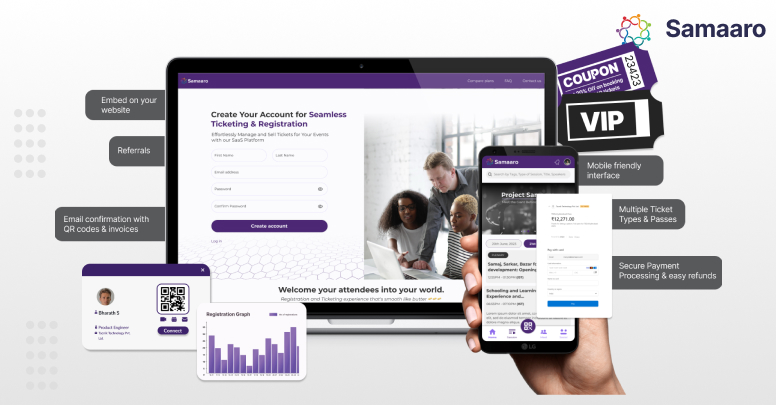
1. Event Website Builder
The first impression is the most significant, and in the world of events, your event website is the digital front door. The event planning software you seek should provide an intuitive website builder that enables planners to create engaging event websites without extensive coding knowledge. The ability to personalise layouts, integrate multimedia, and display essential information such as schedules, speakers, and sponsors enhances the experience of attendees prior to the event.
2. Custom Registrations & Ticketing
Personalised registration experiences are the foundation for effective attendee orientation. The software should facilitate the creation of customised registration forms that capture essential registrant information and adhere to the event’s specific needs. Samaaro also offers CSV uploads for bulk registrations, which simplifies the process for large events. Additionally, single sign-on solutions and integration with popular CRMs ensures a smooth data flow, reducing friction for both attendees and event organisers. Similarly, customizing event tickets enhances the overall experience for attendees and adds a personalized touch to the event.
3. On-site Check-in & Badge Printing Solutions
Creating a favourable first impression is also dependent on streamlining the on-site check-in procedure as much as possible. The software ought to provide capabilities for speedy check-in procedures for attendees. In addition, an integrated badge printing solution enables you to generate badges on-site that have a professional appearance, which improves the experience that each participant has overall.
4. Speaker Management
For events with a constellation of various speakers, it is imperative to have efficient speaker management. Communication between speakers, session allocation, and profile management can be streamlined with a specialised module within the event planning software. Having the option to input speaker biographies, session topics, and presentation materials enables event organisers to create a unified event narrative.
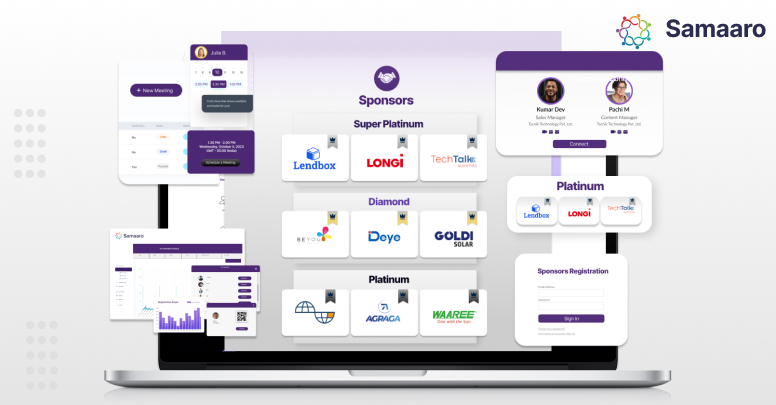
5. Sponsor Management
Sponsors are significant in the funding and enhancement of an event. Managing sponsor relationships effectively is crucial. The software should provide tools for displaying different sponsorship levels, allocating exhibit spaces, and tracking deliverables like logo placement and branding opportunities. Clear channels of communication within the software ensure that sponsors are well-informed and satisfied with their involvement. By providing sponsors with a seamless experience, you can strengthen partnerships and increase the likelihood of future sponsorship.
6. Event App
With the help of the software, you will be able to develop a bespoke application that acts as the participants’ individual guide. They will be able to maintain the event’s excitement at their fingertips while accessing schedules, maps, and real-time updates that are provided. It cannot be denied that mobile event apps have the power to energise attendees of the event. The capability of these applications to enable fast access to information, deliver real-time updates, stimulate timeless connections, and create customised experiences has completely disrupted the event sector and ushered in a new era of innovation.
7. Networking (AI Matchmaking / Meeting Scheduler)
Networking is one of the most valuable aspects of attending events. Utilising AI-powered matchmaking algorithms, event planning software can recommend pertinent connections based on the profiles and interests of attendees. In addition, a meeting scheduler function enables attendees to book one-on-one or group meetings with other delegates, speakers or solution providers. These tools facilitate meaningful interactions and collaborations, resulting in fruitful business opportunities.
Effective marketing is a prerequisite for increasing event attendance and maximising its impact. Event management software with integrated marketing tools permits the creation of targeted email campaigns, social media promotions, and personalised event invitations. Integration with marketing automation platforms improves your ability to cultivate leads and engage with prospective attendees prior to, during, and after an event. You can effectively promote your event, reach a larger audience, and ensure its success by utilising these marketing tools.

9. Accessibility
All events should prioritise inclusivity. Event planning software’s accessibility feature includes real-time translation capabilities for multilingual audiences. This guarantees that language barriers will not prevent attendees from gaining access to valuable content. Providing transcripts for presentations is also advantageous for attendees with auditory impairments or who prefer written content. By providing these features, you create an environment that is welcoming to a wide variety of participants.
10. Engagement
To create a memorable experience, it is essential to keep attendees engaged throughout the event. The software you choose for event planning should include engagement tools such as live polling, interactive Q&A sessions, and gamification capabilities. During sessions, live polling enables real-time audience participation and feedback. Interactive question-and-answer sessions facilitate direct communication between presenters and attendees. Features of gamification, such as scavenger searches or leaderboards, encourage interaction and competition, thereby enhancing the engagement and enjoyment of attendees.
11. Lead Generation
Events are not only about the present; they also provide an excellent opportunity to collect leads for future engagement. Event planning software can integrate digital touchpoints such as QR codes at exhibits, interactive sessions, and lead retrieval tools throughout the event. These touchpoints capture attendee intent, allowing you to collect valuable data for future event planning and targeted follow-up campaigns. Utilising these digital touchpoints increases the value of each participant’s presence.
12. Survey & Other Reports
Feedback collection is essential for evaluating the success of an event and identifying areas for improvement. A comprehensive event planning software should include a survey function accessible via the event app. This feature permits participants to provide real-time feedback on sessions, presenters, logistics, and overall satisfaction. In addition, the software should generate post-event reports that provide information regarding attendance, engagement metrics, and attendee feedback. These reports are fundamental for refining future events, making decisions based on data, and demonstrating the event’s impact.

Built for modern marketing teams, Samaaro’s AI-powered event-tech platform helps you run events more efficiently, reduce manual work, engage attendees, capture qualified leads and gain real-time visibility into your events’ performance.
Location
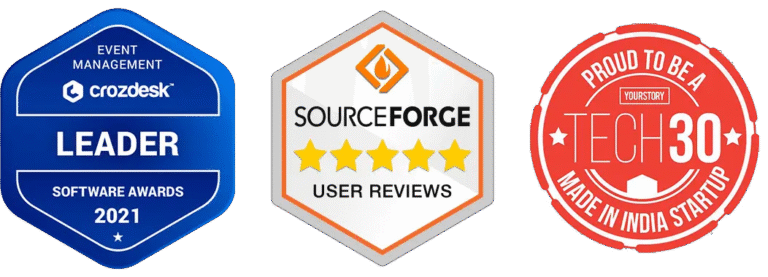
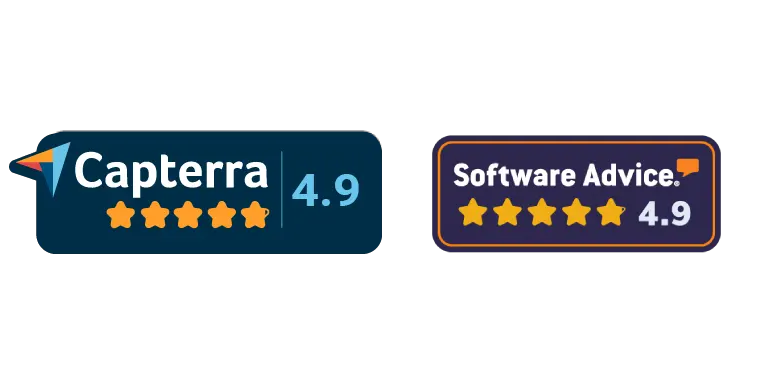
© 2026 — Samaaro. All Rights Reserved.